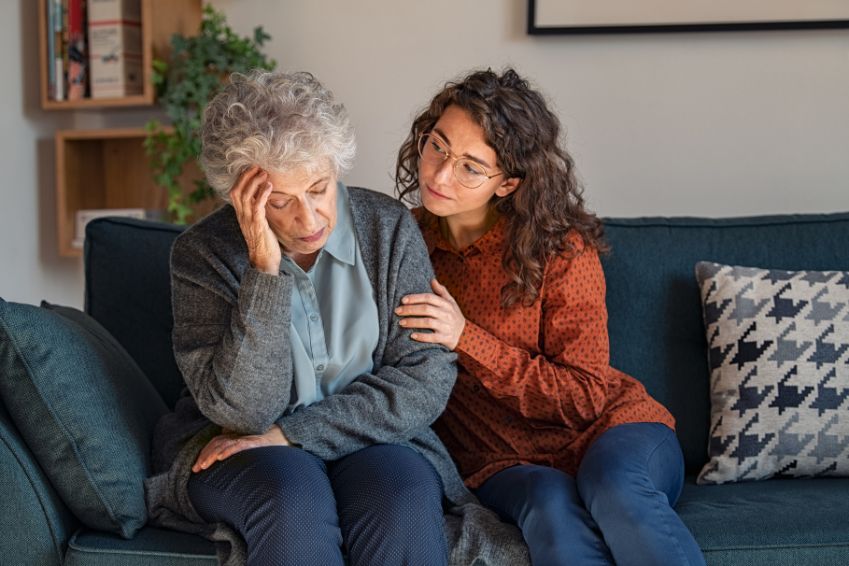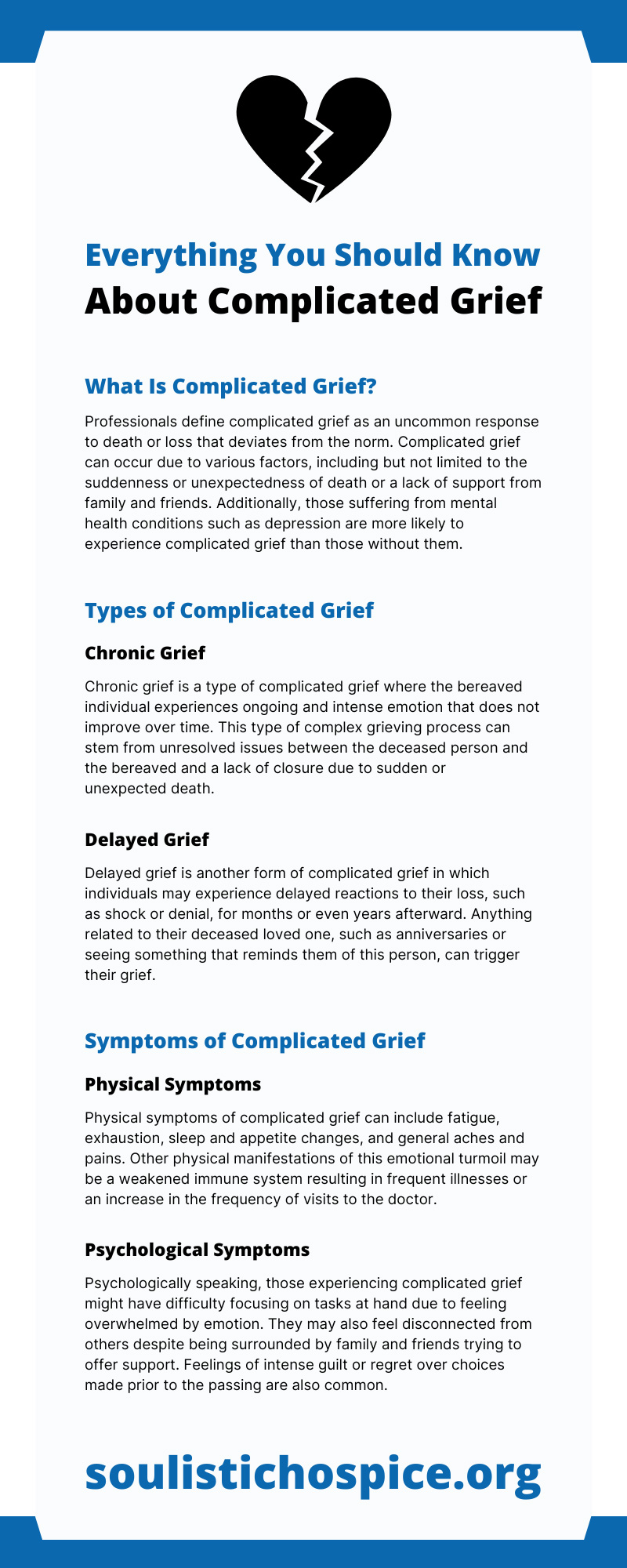
Grief is a natural reaction to the loss of someone or something that we love and cherish. However, some people experience grief in a more complicated way than others. Complicated grief occurs when painful emotions of grief don’t improve with time and instead become more intense. It can be difficult to recognize this kind of grief because it may manifest differently from person to person. Check out our guide for everything you should know about complicated grief.
What Is Complicated Grief?
Professionals define complicated grief as an uncommon response to death or loss that deviates from the norm. Complicated grief can occur due to various factors, including but not limited to the suddenness or unexpectedness of death or a lack of support from family and friends. Additionally, those suffering from mental health conditions such as depression are more likely to experience complicated grief than those without them.
Types of Complicated Grief
The tricky thing about complicated grief is that it affects people differently. Not everyone has the same experience or the same emotions. However, there are a few subtypes of complicated grief that can help you identify which type you or a loved one are going through.
Chronic Grief
Chronic grief is a type of complicated grief where the bereaved individual experiences ongoing and intense emotion that does not improve over time. This type of complex grieving process can stem from unresolved issues between the deceased person and the bereaved and a lack of closure due to sudden or unexpected death. Symptoms might include feelings of disbelief, numbness, guilt, depression, isolation from others, and difficulty concentrating.
Delayed Grief
Delayed grief is another form of complicated grief in which individuals may experience delayed reactions to their loss, such as shock or denial, for months or even years afterward. Anything related to their deceased loved one, such as anniversaries or seeing something that reminds them of this person, can trigger their grief. Other symptoms associated with this type are feeling emotionally detached from friends and family; avoiding activities related to their lost loved one; having trouble sleeping/eating; and withdrawing from social activities.
Exaggerated Grief
Exaggerated grief occurs when an individual’s reaction to their loss goes beyond what would be typical, given the circumstances surrounding it. For example, someone may become overly emotional at times unrelated to the situation (such as attending seemingly mundane events) or experience distress when reminded of their lost loved one. People suffering from exaggerated grief often need more support than usual during this period to cope in healthy ways.
Masked Grief
Masked grief is when someone’s outward behavior seems unaffected despite deep inner turmoil. Someone who is masking their grief may attempt to hide any signs of sadness behind false happiness so others cannot detect what they’re going through internally at all times. It could also manifest through physical complaints such as headaches or stomach aches without any obvious cause for these ailments being present other than the underlying grief.
Symptoms of Complicated Grief
Grief can manifest itself in your life in multiple ways, whether physically, mentally, or emotionally. Identifying these symptoms can sometimes be challenging if you’re unsure what they are. Once you understand the symptoms and their characteristics, you can better determine if these are things you or someone you love is experiencing.
Physical Symptoms
Physical symptoms of complicated grief can include fatigue, exhaustion, sleep and appetite changes, and general aches and pains. Other physical manifestations of this emotional turmoil may be a weakened immune system resulting in frequent illnesses or an increase in the frequency of visits to the doctor.
Psychological Symptoms
Psychologically speaking, those experiencing complicated grief might have difficulty focusing on tasks at hand due to feeling overwhelmed by emotion. They may also feel disconnected from others despite being surrounded by family and friends trying to offer support. Feelings of intense guilt or regret over choices made prior to the passing are also common.
Behavioral Symptoms
In terms of behavior, individuals suffering from complicated grief often find themselves withdrawing from activities they once enjoyed to avoid reminders about their lost loved ones. This process could include canceling social engagements and changing jobs if the profession was something they did with their loved one who passed. It is not uncommon for people experiencing complicated grief to feel very irritable when faced with situations that bring up memories of their loss, either consciously or subconsciously.
Stages of Complicated Grief
The common stages of grief include denial, anger, bargaining, depression, and acceptance. However, the stages associated with complicated grief differ slightly from that of regular grieving processes. Rather than progressing through denial and anger toward acceptance, individuals may experience an intense focus on memories with their loved ones, leading to emotional detachment. A period where avoidance behaviors become prominent may follow. On the other hand, individuals experiencing chronic grief may stay in a stage of depression for an extended period.
It’s important to remember that everyone goes through the stages of grief differently and at their own pace. Not everyone will experience each stage, and some will experience a specific stage for a prolonged time.
How To Handle Complicated Grief
Now that you understand complicated grief, it’s important to learn how to handle it. Creating a strong and supportive network of family and friends is essential when attempting to cope with complicated grief. Having individuals close by who can provide comfort, understanding, and reassurance during difficult moments can be very beneficial in helping bereaved people to overcome this trying time. It is also helpful for them to remember that they do not have to go through it alone. Joining grief support groups can provide a safe space to discuss these emotions with people who are going through similar experiences. You can also seek professional help, such as bereavement care or grief counseling, to receive professional advice, guidance, and support.
Healthy coping mechanisms are also key in managing complicated grief effectively. For example, engaging in physical activities such as exercise or yoga can be beneficial. Building positive relationships with supportive people is also helpful while grieving. You can also develop self-care habits such as reading books or using mindfulness exercises like meditation and deep breathing techniques. These strategies can help those affected to regain control over their lives again following the passing away of a loved one.
Now that you’ve read our guide on everything you need to know about complicated grief, you can identify if you’re experiencing this and get the support you need. Soulistic Hospice offers spiritual care in Arizona that helps individuals to work through their grief effectively.









